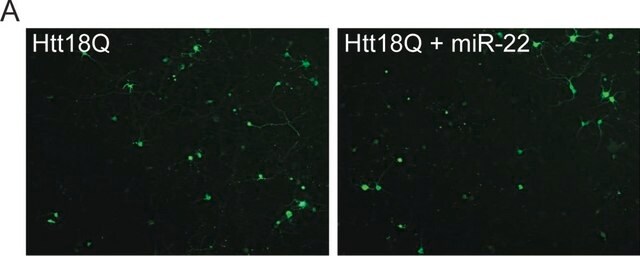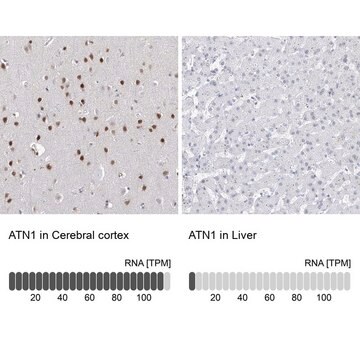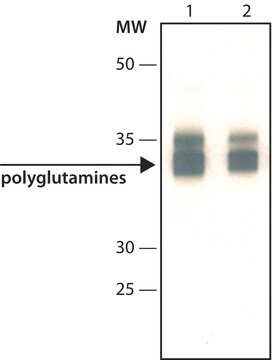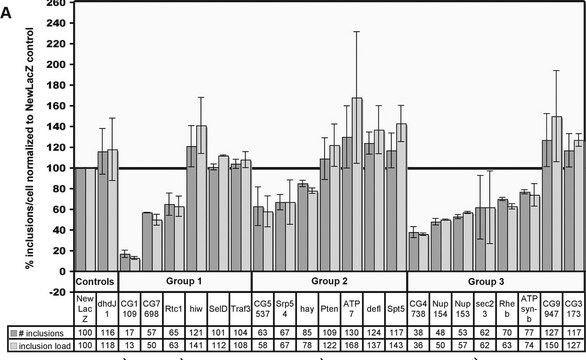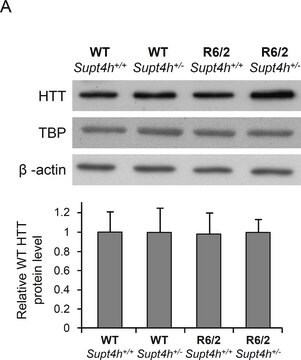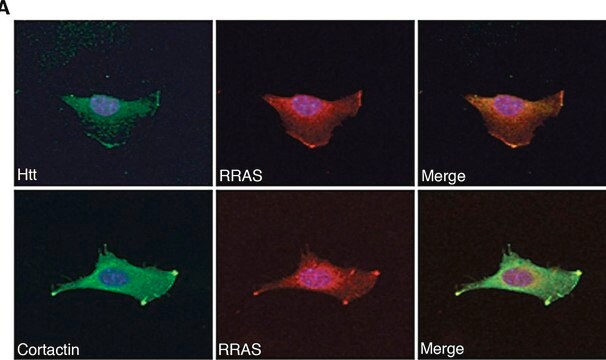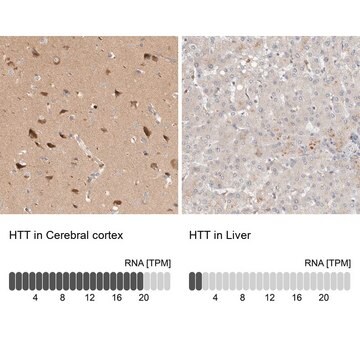추천 제품
생물학적 소스
mouse
Quality Level
항체 형태
purified immunoglobulin
항체 생산 유형
primary antibodies
클론
MW1, monoclonal
종 반응성
mouse, rat, human
포장
antibody small pack of 25 μg
기술
immunocytochemistry: suitable
immunohistochemistry: suitable
western blot: suitable
동형
IgG2b
NCBI 수납 번호
UniProt 수납 번호
배송 상태
ambient
타겟 번역 후 변형
unmodified
유전자 정보
human ... ATN1(1822)
일반 설명
Huntington disease (HD) is a neurodegenerative disorder caused by an expansion of a polyglutamine (PolyQ) domain in the protein huntingtin (htt) that leads to its aggregation into fibrils. PolyQ expansion above 35 -40 results in disease associated with htt aggregation into inclusion bodies. These expanded PolyQ repeats adopt multiple potentially toxic conformations increase atrophin-1 and huntingtin levels and abnormally sequester proteins that are essential for transcription. PolyQ domains of different lengths can display different conformations. The primary sites of neuropathology show variations between different PolyQ disorders, but usually include the cerebellum, striatum, cerebral cortex, brainstem, spinal cord, and thalamus. Huntington s disease (HD) and dentatorubral pallidoluysian atrophy (DRPLA) display clinical similarities, but exhibit different regional pathologies. For example, in HD striatum is the most affected region whereas in DRPLA dentate nucleus of the cerebellum is more severely affected. Clone MW1 strongly binds to the expanded PolyQ of mutant Htt, but does not display any detectible binding to normal human or wild-type murine Htt. The clone MW1, which bind to the polyQ repeat in htt is reported to increase htt-induced toxicity and aggregation. (The clone MW1, which bind to the polyQ repeat in htt is reported to increased htt-induced toxicity and aggregation. (Ref.: Luthi-Carter, R et al. (2012). Hum. Mol. Gen. 11(17); 1927-1937; Legleiter, J et al. (2009). J. Biol. Chem. 284(32); 21647-21658; Ko, J et al. (2001). Brain Res. Bull. 56 (3/4); 319-329).
특이성
Clone MW1 specifically recognize the polyQ domain and does not react with wild-type Htt in any significant manner.
면역원
GST-tagged recombinant proteins expressed from two constructs containing the polyQ domain (19 repeats) and 34 amino acids of the dentatorubralpalliodoluysian atrophy (DRPLA) gene.
애플리케이션
Anti-polyQ specific, clone MW1, Cat. No. MABN2427, is a highly specific mouse monoclonal antibody that targets expanded PolyQ repeats from Huntingtin (Htt) and has been tested for use in Immunocytochemistry, Immunohistochemistry, and Western Blotting.
Research Category
Neuroscience
Neuroscience
Western Blotting Analysis: A representative lot detected expanded polyQ repeats in Htt in Western Blotting applications (Ko, J., et. al. (2001). Brain Res Bull. 56(3-4):319-29; Legleiter, J., et. al. (2009). J Biol Chem. 284(32):21647-58).
Immunohistochemistry Analysis: A representative lot detected expanded polyQ repeats in Immunohistochemistry applications (Ko, J., et. al. (2001). Brain Res Bull. 56(3-4):319-29).
Immunocytochemistry Analysis: A representative lot detected expanded polyQ repeats in Immunocytochemistry applications (Legleiter, J., et. al. (2009). J Biol Chem. 284(32):21647-58).
Immunohistochemistry Analysis: A representative lot detected expanded polyQ repeats in Immunohistochemistry applications (Ko, J., et. al. (2001). Brain Res Bull. 56(3-4):319-29).
Immunocytochemistry Analysis: A representative lot detected expanded polyQ repeats in Immunocytochemistry applications (Legleiter, J., et. al. (2009). J Biol Chem. 284(32):21647-58).
품질
Evaluated by Western Blotting in mouse brain tissue lysate.
Western Blotting Analysis: 0.5 µg/mL of this antibody detected expanded polyQ repeats in Htt in 10 µg of mouse brain tissue lysate. It does not react with normal Htt.
Western Blotting Analysis: 0.5 µg/mL of this antibody detected expanded polyQ repeats in Htt in 10 µg of mouse brain tissue lysate. It does not react with normal Htt.
표적 설명
~350 kDa observed. Uncharacterized bands may be observed in some lysate(s).
물리적 형태
Format: Purified
Protein G purified
Purified mouse monoclonal antibody IgG2b in buffer containing 0.1 M Tris-Glycine (pH 7.4), 150 mM NaCl with 0.05% sodium azide.
저장 및 안정성
Stable for 1 year at 2-8°C from date of receipt.
기타 정보
Concentration: Please refer to lot specific datasheet.
면책조항
Unless otherwise stated in our catalog or other company documentation accompanying the product(s), our products are intended for research use only and are not to be used for any other purpose, which includes but is not limited to, unauthorized commercial uses, in vitro diagnostic uses, ex vivo or in vivo therapeutic uses or any type of consumption or application to humans or animals.
Not finding the right product?
Try our 제품 선택기 도구.
WGK
WGK 1
시험 성적서(COA)
제품의 로트/배치 번호를 입력하여 시험 성적서(COA)을 검색하십시오. 로트 및 배치 번호는 제품 라벨에 있는 ‘로트’ 또는 ‘배치’라는 용어 뒤에서 찾을 수 있습니다.
Leah Gottlieb et al.
The Journal of biological chemistry, 297(6), 101363-101363 (2021-11-05)
Huntington's disease (HD) is a neurodegenerative disorder caused by a poly-CAG expansion in the first exon of the HTT gene, resulting in an extended poly-glutamine tract in the N-terminal domain of the Huntingtin (Htt) protein product. Proteolytic fragments of the
자사의 과학자팀은 생명 과학, 재료 과학, 화학 합성, 크로마토그래피, 분석 및 기타 많은 영역을 포함한 모든 과학 분야에 경험이 있습니다..
고객지원팀으로 연락바랍니다.
